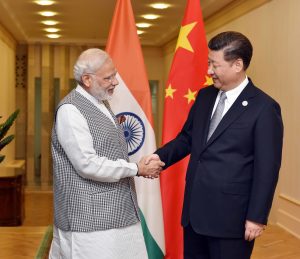India was the first non-communist country in Asia to establish diplomatic ties with the People’s Republic of China on April 1, 1950. But the plans for celebrating the 70th anniversary of the event have been hit by the coronavirus pandemic.
Despite the cancellation of 70th anniversary events, a senior Chinese official is reported to have said that the two countries “will emerge stronger and their relationship can scale new heights after the pandemic.” The presidents and the premiers on both sides have exchanged congratulatory messages and have made the expected euphoric statements about the two working together to “bring more benefits to the two countries and peoples and contribute more positive energy to Asia as well as the world.”
The Chinese Ambassador to India, Sun Weidong, tweeted Foreign Minister Wang Yi’s reference to the Panchsheel principles, “the Five Principles of Peaceful Coexistence, which is a historic contribution to the promotion of a new type of intl relations.” Considering Sino-Indian history, the Panchsheel may not have been the best reference, considering that Indian officials rarely invoke it because it is associated in Indian perceptions with the Sino-Indian war of 1962 and what is widely seen as Chinese betrayal. That aside, there are also questions about how the coronavirus pandemic will affect Sino-Indian ties.
Responding to a question during the daily press briefing, Chinese Foreign Ministry spokesperson Hua Chunying sounded quite jubilant. The spokesperson pointed out that during the second informal Sino-Indian leaders summit in Chennai, Prime Minister Narendra Modi and President Xi Jinping had agreed to host 70 activities commemorating the 70 years of diplomatic relations, which will contribute to significant progress on the bilateral ties, and highlighted the “deep historical connection between two ancient civilizations.” The planned activities were supposed to cover an entire gamut of areas including legislature, business, culture, and defense.
Also, the foreign ministries of both countries announced detailed plans for celebrations in October 2019. Hua went on to say that with the 70th anniversary celebration “as an opportunity, we would like to work with India to elevate our bilateral relationship to a new height.” On another question about whether China would send help India in fighting address the pandemic by supplying ventilators, the spokesperson said that it would do what it can once the domestic demand is met.
As of now, the Indian government has been careful not to blame China for the coronavirus or its propagation because of China’s actions. Indeed, External Affairs Minister Dr. S Jaishankar tweeted saying he had discussed with both State Councilor and Foreign Minister Wang Yi in addressing the corona virus and build collaborative efforts in this regard. China has tried to woo India by saying that it “stands ready to share its experience in epidemic prevention and control and diagnosis and treatment, and provide further support and assistance to the best of our capability.” But there is likely to be some wariness in Delhi, based on the kind of Chinese assistance provided to a number of countries including Italy, Czech Republic, and Spain, where even the testing kits sent from China showed faulty results.
Moving forward, China’s role in the pandemic is likely to have a negative impact on Sino-Indian relationship. If China had been transparent, the pandemic could have been tackled much more efficiently, and this is clear for all to see including India. Not only has China been not transparent about the level of spread within the country and the human transmission issues, but more importantly it had silenced the World Health Organization and other international organizations from raising concerns about the Wuhan virus.
That WHO went one step ahead with its Director General Tedros Adhanom Ghebreyesus praising China for its “transparency” and added that China is a model to follow as far as the response to the virus management is concerned made this clear for all to see. This is despite the fact that there were ample number of reports pointing to the Chinese state efforts to cover up the extent of the virus’ outbreak and silencing of whistleblowers. It should be noted that the current Director General came to office in 2017 with China’s backing.
Though India has so far managed to control the spread of the coronavirus within the country with a national lockdown, the economic costs are going to be large, and it is likely that public perception in India is likely to blame China for the damages this has caused, once the pandemic itself is under control. Though India is unlikely to officially blame China, Beijing’s behavior will deepen the general public distrust of China and it will impact Indian domestic debate about Sino-Indian ties. Thus, for all the polite words and mutual congratulations about the anniversary, the pandemic once again seems to indicate to New Delhi that China is likely to be an irresponsibly selfish actor, deepening the concern that India already had about China’s behavior.

































